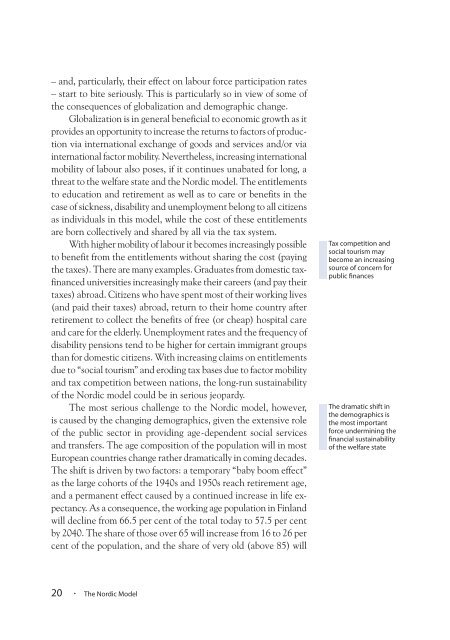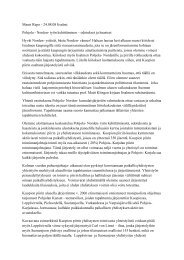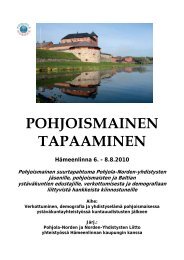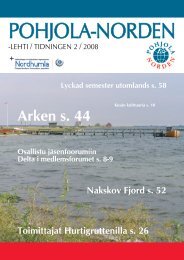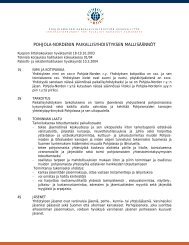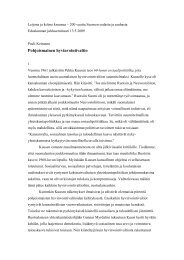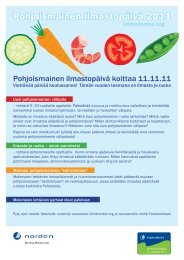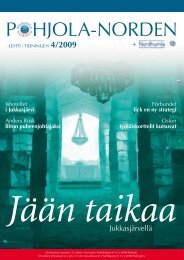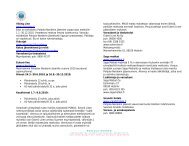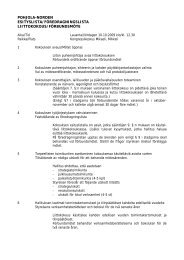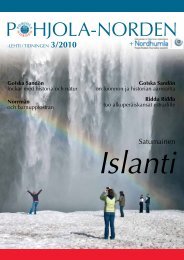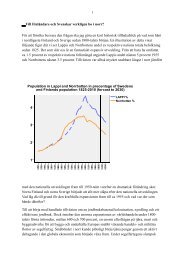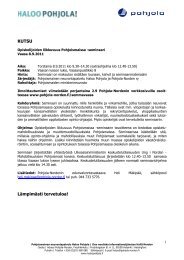The Nordic Model - Embracing globalization and sharing risks
The Nordic Model - Embracing globalization and sharing risks
The Nordic Model - Embracing globalization and sharing risks
Create successful ePaper yourself
Turn your PDF publications into a flip-book with our unique Google optimized e-Paper software.
– <strong>and</strong>, particularly, their effect on labour force participation rates<br />
– start to bite seriously. This is particularly so in view of some of<br />
the consequences of <strong>globalization</strong> <strong>and</strong> demographic change.<br />
Globalization is in general beneficial to economic growth as it<br />
provides an opportunity to increase the returns to factors of production<br />
via international exchange of goods <strong>and</strong> services <strong>and</strong>/or via<br />
international factor mobility. Nevertheless, increasing international<br />
mobility of labour also poses, if it continues unabated for long, a<br />
threat to the welfare state <strong>and</strong> the <strong>Nordic</strong> model. <strong>The</strong> entitlements<br />
to education <strong>and</strong> retirement as well as to care or benefits in the<br />
case of sickness, disability <strong>and</strong> unemployment belong to all citizens<br />
as individuals in this model, while the cost of these entitlements<br />
are born collectively <strong>and</strong> shared by all via the tax system.<br />
With higher mobility of labour it becomes increasingly possible<br />
to benefit from the entitlements without <strong>sharing</strong> the cost (paying<br />
the taxes). <strong>The</strong>re are many examples. Graduates from domestic taxfinanced<br />
universities increasingly make their careers (<strong>and</strong> pay their<br />
taxes) abroad. Citizens who have spent most of their working lives<br />
(<strong>and</strong> paid their taxes) abroad, return to their home country after<br />
retirement to collect the benefits of free (or cheap) hospital care<br />
<strong>and</strong> care for the elderly. Unemployment rates <strong>and</strong> the frequency of<br />
disability pensions tend to be higher for certain immigrant groups<br />
than for domestic citizens. With increasing claims on entitlements<br />
due to “social tourism” <strong>and</strong> eroding tax bases due to factor mobility<br />
<strong>and</strong> tax competition between nations, the long-run sustainability<br />
of the <strong>Nordic</strong> model could be in serious jeopardy.<br />
<strong>The</strong> most serious challenge to the <strong>Nordic</strong> model, however,<br />
is caused by the changing demographics, given the extensive role<br />
of the public sector in providing age-dependent social services<br />
<strong>and</strong> transfers. <strong>The</strong> age composition of the population will in most<br />
European countries change rather dramatically in coming decades.<br />
<strong>The</strong> shift is driven by two factors: a temporary “baby boom effect”<br />
as the large cohorts of the 1940s <strong>and</strong> 1950s reach retirement age,<br />
<strong>and</strong> a permanent effect caused by a continued increase in life expectancy.<br />
As a consequence, the working age population in Finl<strong>and</strong><br />
will decline from 66.5 per cent of the total today to 57.5 per cent<br />
by 2040. <strong>The</strong> share of those over 65 will increase from 16 to 26 per<br />
cent of the population, <strong>and</strong> the share of very old (above 85) will<br />
Tax competition <strong>and</strong><br />
social tourism may<br />
become an increasing<br />
source of concern for<br />
public finances<br />
<strong>The</strong> dramatic shift in<br />
the demographics is<br />
the most important<br />
force undermining the<br />
financial sustainability<br />
of the welfare state<br />
20 · <strong>The</strong> <strong>Nordic</strong> <strong>Model</strong>


